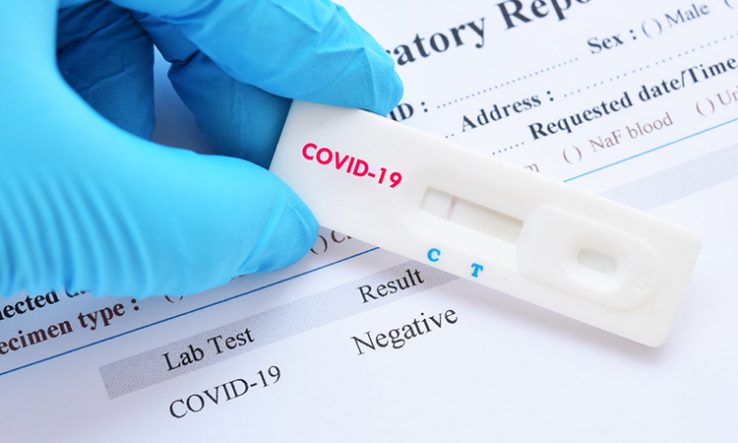
Industry frustrated by failed attempts to reach UK agencies on Covid-19 testing roll-out
Companies involved in testing for Covid-19 are saying they are “keen to help” but that the UK government has been slow to react to their offers or clear the way to standardise products already in use in other countries.
As the Covid-19 crisis worsens in the UK, the National Health Service has struggled to keep up with demand for tests. Several private firms have told Research Professional News that they repeatedly tried to contact UK agencies, but waited weeks for a response as the clock ticked. Some have yet to hear back.
“We want to do more and provide tests to the NHS, and if there is a clear route to doing this we would be on board straight away,” said Winnie Wu, chief operating officer at GeneFirst, a company that currently has two tests for Covid-19, one of which is ready for market.
“We still don’t have a clear route to engaging with the health authority for supplying the tests,” she said, adding the company is “keen to help”.
Wu said her company had made attempts to reach Public Health England to discuss testing requirements before she was contacted by individual NHS trusts in early April, suggesting that the engagement process between PHE, NHS and diagnostic firms remains unclear.
She said that GeneFirst had received numerous enquiries from online pharmacies and private accredited laboratories wishing to purchase the test.
Other private groups reported similar issues in contacting the government. They told Research Professional News about a lack of response from UK agencies including PHE, the NHS and the Medicines and Healthcare products Regulatory Agency, which must approve new tests before they can go to market.
“We had offered the government an outsourced testing solution almost a month ago but the discussion didn’t really go anywhere,” said a representative of another diagnostics company, who wished to remain anonymous because of ongoing talks with the government.
“The biggest issue we have at the moment is with the MHRA and its unresponsiveness,” the person said, adding that the company’s tests were already officially registered with regulators in Germany and Belgium. “We are still waiting for them to approve our company account,” they said—a prerequisite before registering products.
GeneFirst has also been working in Europe, particularly in France, where it received orders for nearly 20,000 single-gene Covid-19 tests in the first week of April. Wu anticipated that demand would climb to 100,000 or 200,000 tests in coming weeks, a figure she thought the company could meet, provided raw materials came in on time.
Even so, she is worried that the UK government lags behind in standardising Covid-19 tests. Currently, the tests are self-certified with a ‘CE’ mark.
“The danger of not having performance specifications is that some tests will inevitably fail to meet the standard,” she said.
Several companies making the tests have also cited supply chain concerns.
A spokeswoman for Randox, currently the official test supplier to the NHS, said that while its test is manufactured internally, “there are clearly unprecedented pressures on wider global supply chains”, adding “we are working with the government to deal with these issues and to optimise the testing that can be made available”.
But Sebastian Winkler, the head of new ventures for Medbelle, a plastic surgery clinic which recently started providing Covid-19 swab tests, said that the NHS could further boost its testing capacity by sending samples to private laboratories.
After weeks and multiple attempts by Medbelle to reach the NHS to offer help, he said that on 4 April the agency had finally contacted the laboratory used by his company to send samples for testing.
But even with the private sector taking some of the load off the government, figures in the industry caution that testing efforts may not be able to keep pace with demand.
“We’re limited by what our suppliers can provide on a weekly basis,” said Wu. “If someone comes along tomorrow and says, ‘I need a million kits’—I can’t imagine anyone able to meet that.”
Research Professional News has contacted PHE, the NHS and the MHRA for comment.
“The government is working in partnership with a number of companies and organisations across the public and private sectors to scale up testing and tackle coronavirus,” said a Department of Health and Social Care spokesperson. “We welcome all offers of support and that is why we have set up a clear and easy process by which these can be made and carefully considered.”
Research Professional News understands that the DHSC has set up a process to evaluate all offers of help and tests using an external expert panel to make sure there is a consistent and strategic way of evaluating them.
The Foundation For Innovative New Diagnostics (FIND) is collating a pipeline of diagnostic tests, with around 229 listed worldwide, some 15 of those by companies and labs with bases in the UK.
The UK efforts include the following:
- Aptamer Group, in Heslington, North Yorkshire
- AusDiagnostics, in Chesham
- Attomarker, in Exeter
- BioSure, in Nazeing
- Cepheid UK, in High Wycombe
- DRW (Europe), in Little Chesterford, Cambridgeshire
- Edinburgh Genetics Limited, in Edinburgh
- Genedrive, in Manchester
- GeneFirst, in Abingdon
- Mologic, in Thurleigh, Bedfordshire
- Novacyt, in Camberley
- Primerdesign, in Chandler’s Ford
- QuantuMDX, in Newcastle
- Randox, in Crumlin
- Sengenics, in Cambridge
